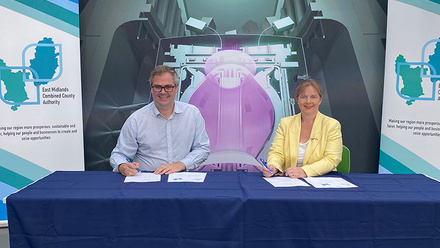Developing a Materials World – what do students think?
In the second of a series of articles, the team behind the UK’s collaborative Discover Materials initiative report on students' perceptions of materials science and engineering.

This article was written by: Dr Mark Coleman, Senior Lecturer in Materials Engineering, Swansea University; Dr Eleonora D’Elia, Strategic Teaching Fellow, Imperial College London; Dr Fiona Hatton MIMMM, Lecturer in Polymer Chemistry, Loughborough University; Amanda Southworth, ROSE (Recruitment, Outreach and Student Experience) Coordinator, University of Sheffield; Dr Han Zhang MIMMM, Lecturer in Materials Science, Queen Mary University of London; Dr Chris Hamlett, Henry Royce National Outreach Officer for Materials Science and Engineering, Discover Materials and University of Birmingham.
The modern Materials Science and Engineering (MSE) course has grown into a rich and diverse discipline, a far cry from its historic beginnings in blacksmithing and metallurgy. MSE now encompasses a range of different areas that underpin other engineering disciplines and highlights the strength of MSE as an interdisciplinary field of study and research.
Communication is the key ingredient enabling materials engineers to thrive in such interdisciplinary groups, but how well do we communicate our research/discipline to the general public, and how much do younger students actually know about MSE? This article, the second of three, aims to highlight the issues that face the subject and builds on some of the conclusions regarding low student application numbers raised in the first article (Developing a materials world – why (not) us?, Materials World, March 2021).
Here, we focus on the data provided by both an internal survey of current Materials undergraduates across the UK and a larger survey of 2,000 16-18-year-olds who represent potential future students. Our findings show that it is imperative to promote MSE to the wider public and schools, or its growth and impact could be hindered by a lack of trained practitioners.
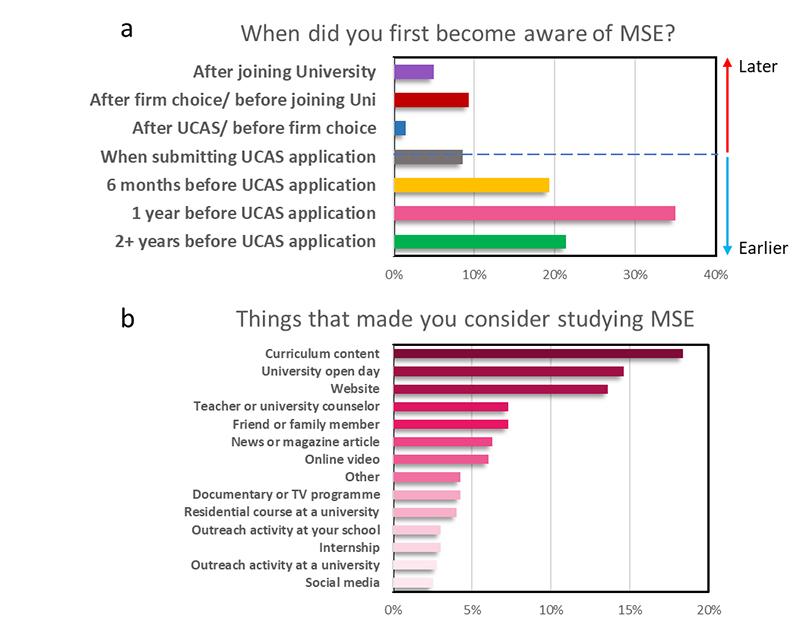
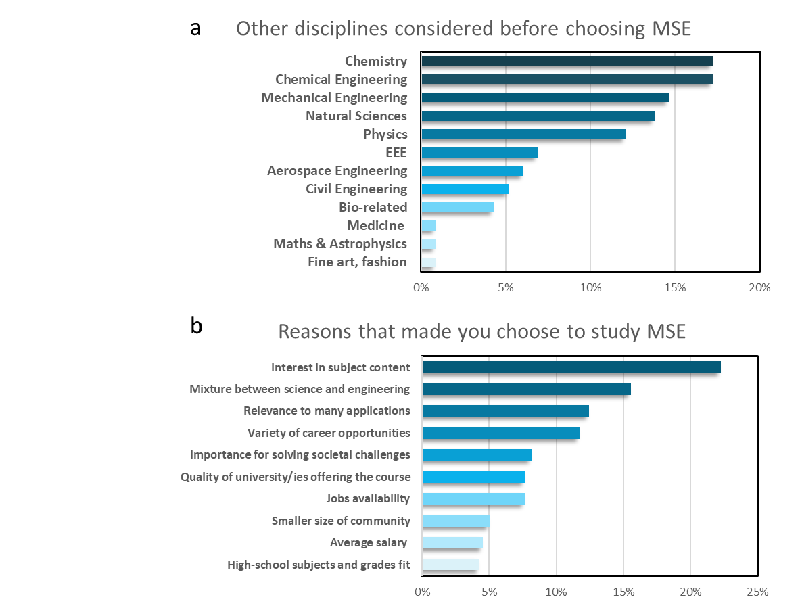
Our current cohort
First-year undergraduate students, enrolled on UK MSE degree programmes, were surveyed to gain insights into what motivated them to choose MSE, when they became aware of the discipline and which other subjects they had also considered.
We canvassed students in the 2019-2020 academic year intake and received 170 responses from Discover Materials partner institutes. Interestingly, one fifth had not initially applied for a MSE degree and instead had received a change of course offer, indicating a general lack of awareness of MSE during the degree selection process (see Figure 1).
Over a third (35%) of respondents had not heard of MSE as a subject until one year before applying to university, with almost half discovering Materials within six months (or sooner) before submitting their Universities and Colleges Admissions Service (UCAS) applications. Collectively, over three quarters of students (76%) became aware of MSE six months to two years before submitting their UCAS application (1a).
Students indicated that they became aware of the subject from a university open day, a website, or from a friend or family member (1b). This highlights the importance of promoting MSE through high-quality university webpages and raising awareness of the discipline within schools.
The good news is that once students became aware of the subject, the majority (62%) considered studying MSE within six months to a year of submitting their application. This was driven by factors such as interesting curriculum content, the blend of science and engineering, and its relevance to many applications and subsequent career opportunities (see Figure 2a).
Very few students considered the average starting salary as a main reason for choosing MSE. Even fewer (<5%) pointed out that MSE aligned with the subjects they studied at school, which suggests that it is currently a hidden component of the A-Level curriculum.
When asked which other disciplines students had considered before choosing MSE, the main competitors were not unexpected, including Chemistry, Chemical Engineering, Mechanical Engineering, Natural Sciences and Physics. We were surprised that our MSE students had not also considered other types of Engineering subjects, such as Aerospace, Civil and Bio-related Engineering as there are many overlapping modules between these courses (Figure 2b).
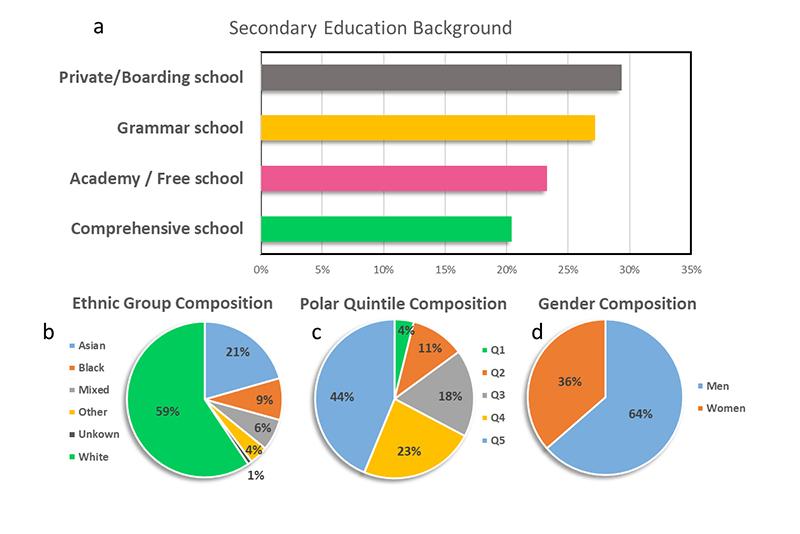
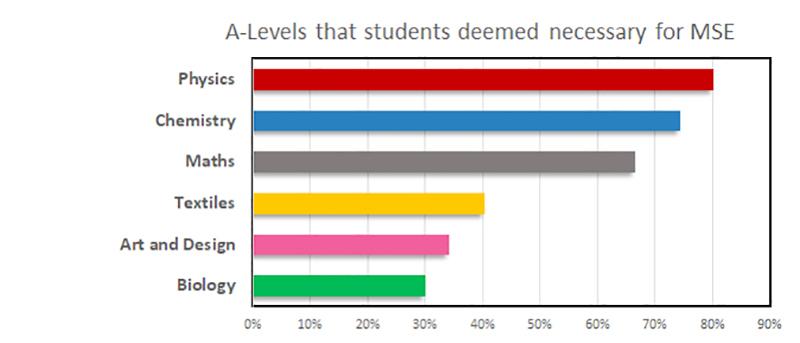
Delving into diversity
The current student survey reveals some worrying trends regarding accessibility, with private and grammar schools being over-represented within the cohort (see Figure 3a). The diversity of UCAS applicants based on polar quintile also shows that a large proportion are from a higher quintile, Q5 = 44% (see Figure 3c). It is clear that applicants from lower income families and less affluent areas are under-represented in UCAS MSE admissions and that recruitment activities and outreach programmes must therefore work to widen participation.
At first glance, the UCAS 2019 application data suggests a high proportion of white applicants at 59% (Figure 3b), with other ethnic groups under-represented.
However, on closer inspection, it can be seen that Asian students make up a significant proportion of applications, 21%, many of whom would be international students. This shows the high regard in which MSE courses in the UK are held by overseas institutions and students. It is difficult, without a proper breakdown of density of collection of data by area, to draw exact conclusions on the black/mixed ethnic group composition. This will need further analysis.
Finally, the UCAS diversity data shows that MSE applicants are predominantly male (Figure 3d) and that, despite the active encouragement of female students to MSE courses, the ratio of female to male applicants remains stubbornly low (at around one third).
However, this is representative of the gender diversity seen in A-Level STEM subjects, which suggests that gender diversity in MSE applications may be inherited from the recruitment pool of A-Level students. If this is true, then a more long-term strategy for outreach and recruitment targeting younger students should be considered.
The future potential
To assess the views of younger students, 2,000 16-18-year-olds were surveyed in June 2020. Some of those polled were in higher education, but of those who were not, 88% were planning on going to university, with about a quarter of those (23%) planning to apply for places on science or engineering courses.
Interestingly, of those going to university, 78% either agreed, or strongly agreed, that their A-Level (or equivalent) courses were chosen based on what they wanted to study at university and 74% had a job in mind when they chose their university degree course.
Unfortunately, nearly half of those surveyed (48%) had never heard of Materials, Materials Science or MSE, highlighting the importance of improving awareness at this stage thus enabling students to choose the best mix of A-Levels for MSE courses.
Fortunately, many students deemed Physics, Chemistry and Maths as good A-Level choices necessary for an MSE course (see Figure 4). However, 40% believed Textiles would also be a good option, highlighting the lack of understanding at this stage. To explore this lack of knowledge, the following definition was offered to those surveyed:
'Materials science teaches what things are made of and why they behave as they do. Materials engineering shows how to apply knowledge to make better things. Materials scientists and engineers integrate chemistry, physics, maths and biology with engineering to address global challenges relevant to technology, society and the environment...'
This definition did not match the expectations of 90% of respondents, however, one in three found MSE more appealing after reading this definition and almost one in five would have been more likely to choose it as a degree.
When making their degree choices, online resources, university websites and advice from parents and family members were the most influential (Figure 5a). The survey also revealed the choice of A-level subjects were largely driven by the desire to study a particular subject at university. This was particularly strong for respondents wishing to study science/engineering, however, these students were least likely to have a final career in mind when deciding which subject to pursue.
Of those not planning to study science or engineering specifically, a significant portion (70% combined) said they made the decision because they perceived it as too hard, they had no interest, or they did not have the right A-level subjects (Figure 5b). Although it may be harder to convince those students to pursue a degree in MSE, the other factors such as poor awareness of job opportunities and a general lack of understanding and information may be impacted by the Discover Materials group.
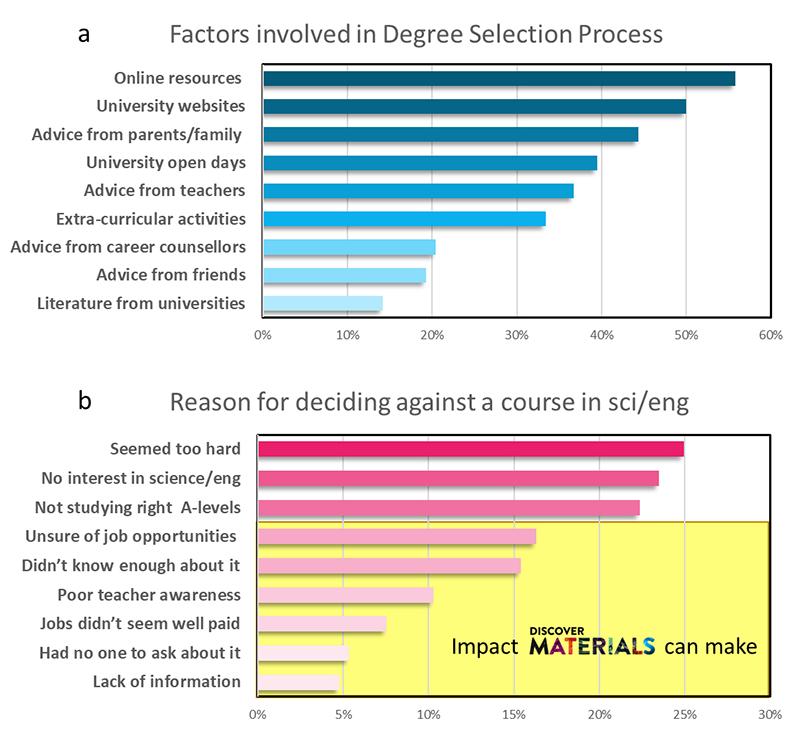
Next steps
Asking (potential) students revealed some important answers that could help us to create a strong, high profile discipline, recognised on par with subjects such as Physics, Mechanical Engineering and Chemistry. The surveys highlighted how increasing the knowledge and information surrounding MSE careers, appropriate A-Level selection, course content and definitions of MSE would have a strong impact on the decision-making process of hundreds of students. Both surveys have shown that most students were not aware of MSE until they started considering university degrees, which is too late, as A-Level choices have already been made. The surveys also highlight the fundamental need to diversify our student cohort and promote a welcoming environment that widens access to students from more diverse backgrounds.
We need to be able to raise awareness of MSE as a discipline within schools at an earlier stage, as students seem more interested after understanding its definition. There is hope that by introducing MSE to younger students, clarifying its impact on society and displaying the range of job opportunities, we can recruit for the future. This is where the Discover Materials network could have the biggest impact.
The external survey was jointly commissioned by Discover Materials and the Henry Royce Institute and carried out by OnePoll in June 2020.
The authors are members of the Discover Materials Working Group, a partnership between UK Universities Materials Science and Engineering Departments, the Henry Royce Institute, and other parties with interests in Materials Science and Engineering. To find out more, visit: www.discovermaterials.uk


